牛津译林版-英语-七上-4单元 My Day 知识点
译林版英语七年级上册第四单元语法课件

19
We put an adverb of frequency before a verb except when it is the verb ‘to be’.
I always am happy. I am always happy. He often goes home by bike. He goes often home by bike.
17
Complete exercises (on page48 ) then check answers.
1)Simon loves playing football. He often plays football in the playground.
2)Sandy doesn’t have much time to play tennis. She seldom plays tennis.
14
我们可以使用频度副词来表示做某件事的频率。
1. My aunt cleans the room every day. She always does the cleaning.
2. My uncle goes to the Singing Club five times a week. He usually sings songs after work.
6. My cousin is a good boy. He never plays tricks
on his Dad.
15
Look and fill in the blank
SMADKiamainlinltdoyitienyellikes gdsowpaeplnisamlcayrisnoys lsgabflo.efaStordehotrsmbetkbsaiacnaltlhltilaon.fnogtl.de.Srahnscech’esonoaolf.tevrery gsocohdooalt. it.
牛津译林版英语七年级上册单元知识点归纳1-4单元
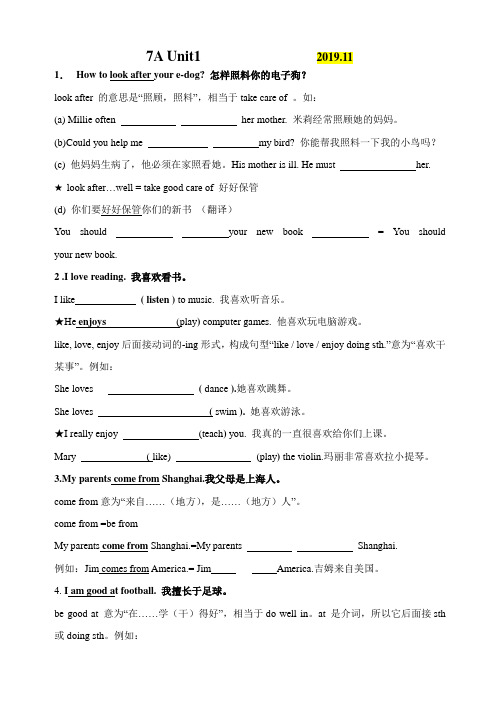
7A Unit1 2019.111.How to look after your e-dog? 怎样照料你的电子狗?look after 的意思是“照顾,照料”,相当于take care of 。
如:(a) Millie often her mother. 米莉经常照顾她的妈妈。
(b)Could you help me my bird? 你能帮我照料一下我的小鸟吗?(c) 他妈妈生病了,他必须在家照看她。
His mother is ill. He must her.★ look after…well = take good care of 好好保管(d) 你们要好好保管你们的新书(翻译)You should your new book = You should your new book.2 .I love reading. 我喜欢看书。
I like ( listen ) to music. 我喜欢听音乐。
★He enjoys(play) computer games. 他喜欢玩电脑游戏。
like, love, enjoy后面接动词的-ing形式,构成句型“like / love / enjoy doing sth.”意为“喜欢干某事”。
例如:She loves ( dance ).她喜欢跳舞。
She loves( swim ).她喜欢游泳。
★I really enjoy (teach) you. 我真的一直很喜欢给你们上课。
Mary ( like) (play) the violin.玛丽非常喜欢拉小提琴。
3.My parents come from Shanghai.我父母是上海人。
come from意为“来自……(地方),是……(地方)人”。
come from =be fromMy parents come from Shanghai.=My parents Shanghai.例如:Jim comes from America.= Jim America.吉姆来自美国。
Unit4知识点 牛津译林版英语七年级上册

7AU4知识点New words and expressions:1.wake up.He wakes up at six o’clock.1.He wakes her up at seven o’clock.2/Shall we go fishing this afternoon?OK/Good idea! That’s all right. (No,let’s go shopping.3.He seldom goes out.He’s never late for school.4.She has breakfast/lunch/dinner.5.I need to go home early6.have a good rest7.have fun/have a good (great) time (in) doing sth.I have fun playing football8.have lessons/have an English lesson.9.after-school activities10.do one’s homeworkHe does his homework/We do our homework.He doesn’t do his homework./Does he do his homework?11.go to bed. He goes to bed at 9/He gets up at six .12.be late for He is late for school/the meeting.13.The meeting/Our school starts at 8 o’clock.14.a quarter past six/seven half past eight15.at six in th emorning/afternoon16.play football first.17.chat with him/her chat with each other18.learn from each other/ help each other19wish best wishes wish you successWish your team good luck.20.would like to go shopping.Would you like to go shopping this afternoo ?21.save my life---save their lives.22.go to the museum.23twice a week/once a year. How often does he go home?24.go on a picnic=go on picnics25.dislike playing games27.get ready for th eparty/th emeeting.28.learn a lot about the worldLanguage points: 1.It’s time for breakfast=It’s time to have breakfast2.Shall we go running/walking in the hill?3.I seldom go out /play games.4.After sleep I sleep.5.nad a good rest/He needs some milk.6.I don’t know how to have fun/what to do /how to do it/where to go7.What time do you strat lessons?8enjoy myself/enjoy working in Beijing/living in Shanghai.9.talk about playing games.10.from Monday to Friday—five days a week.11.Our lessons begin at 8:15.12.My favourite subject is English/sport is swimming.13.a lot of friends—lots of /many14.They are all nice(kind) to us---All of them are nice to us.15.a Reading Club16.read books/borrow books from the library.17.I also like playing volleyball.18.I’m in the school volleyball team=I’m a member of the school team.19.on Wednesday afternoon20.in the evening/in March/in winter/in 2202/in 2012.321.on Saturday/on 1 July/on Sunday morning/on Children’s Dayon a cold morningo/ on the afternoon of September 122.at seven o’clock/at 6 years old/at Christmas23.Thanks for your e-mail/giving me a pen/helping us with our English.24.tell you about my life/tell us about your school.25.I’m good at playing football=I play footballwell.26.He often plays football in the playground.27.She doesn’t have lunch time to play tennisShe has atime to sing.28.She’s a member of th eswimming team.She usually swims after school.29.He never plays basketball.30.He goes to her dancing lessons.31.She always dances for half an hour.32.She sometimes goes roller skating.33.Saturday ,7 November.34.Welcome to our schol/our school football match.35.There’s a volleyball match between A and B.36.He goes there by bus.37.I hope everyone can come and watch the game.38Wish our team good luck.39.What do you like to do at weekends?40.How often do you visit the Great Wall.Twice a month41.Morning exercises are good fo rus.42.Reading in th esun is bad for your eyes.43.have too much homework to do.44.so I can’t play basketball well.45.It helps me get ready for the day.48.I don’t like singing.49.It’s fun/interesting.。
牛津译林版七年级上册(2024)Unit 4 School day 语言点和语法点整理
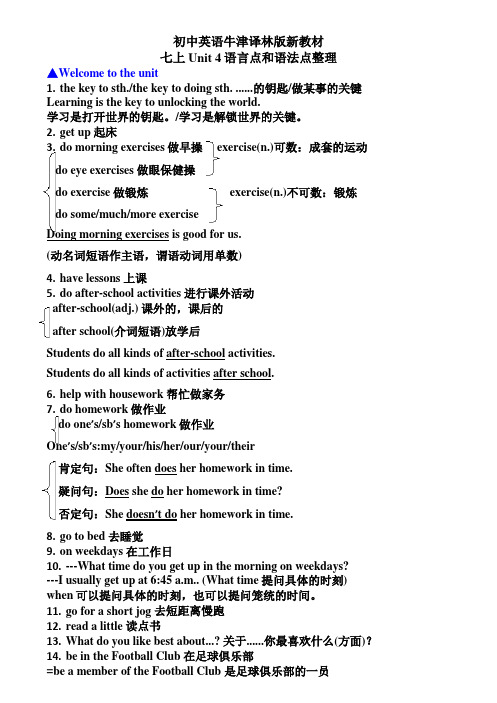
初中英语牛津译林版新教材七上Unit 4语言点和语法点整理▲Welcome to the unit1.the key to sth./the key to doing sth. ......的钥匙/做某事的关键Learning is the key to unlocking the world.学习是打开世界的钥匙。
/学习是解锁世界的关键。
2.get up 起床3.do morning exercises做早操 exercise(n.)可数:成套的运动 do eye exercises 做眼保健操do exercise 做锻炼 exercise(n.)不可数:锻炼do some/much/more exerciseDoing morning exercises is good for us.(动名词短语作主语,谓语动词用单数)4.have lessons 上课5.do after-school activities 进行课外活动after-school(adj.) 课外的,课后的after school(介词短语)放学后Students do all kinds of after-school activities.Students do all kinds of activities after school.6.help with housework 帮忙做家务7.do homework做作业do one’s/sb’s homework做作业One’s/sb’s:my/your/his/her/our/your/their肯定句:She often does her homework in time.疑问句:Does she do her homework in time?否定句:She doesn’t do her homework in time.8.go to bed 去睡觉9.on weekdays 在工作日10.---What time do you get up in the morning on weekdays?---I usually get up at 6:45 a.m.. (What time提问具体的时刻) when可以提问具体的时刻,也可以提问笼统的时间。
牛津译林版-英语-七上-7A 4单元 My Day教案+学案(第六课时)
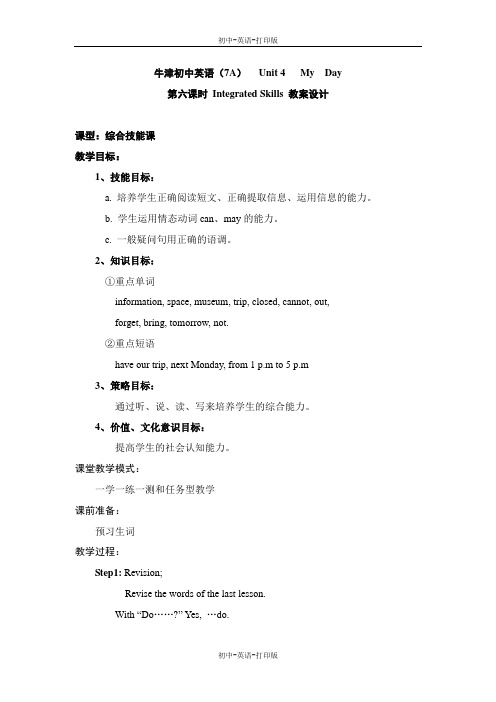
牛津初中英语(7A)Unit 4 My Day第六课时Integrated Skills 教案设计课型:综合技能课教学目标:1、技能目标:a. 培养学生正确阅读短文、正确提取信息、运用信息的能力。
b. 学生运用情态动词can、may的能力。
c. 一般疑问句用正确的语调。
2、知识目标:①重点单词information, space, museum, trip, closed, cannot, out,forget, bring, tomorrow, not.②重点短语have our trip, next Monday, from 1 p.m to 5 p.m3、策略目标:通过听、说、读、写来培养学生的综合能力。
4、价值、文化意识目标:提高学生的社会认知能力。
课堂教学模式:一学一练一测和任务型教学课前准备:预习生词教学过程:Step1: Revision;Revise the words of the last lesson.With “Do……?” Yes, …do.No, …don’t.“Does…? Yes, …does.No, …doesn’t. ”Step2: A school tripA1: 1) Read the Note (with questions)2) Read the poster.To complete A2.A2: 1) Complete A22) Check the answers (with the information of A1)A3:1) Listen2) Complete3) Check the answersA4:1) Read posters of A1&A2 again2) Complete3) Check the answersStep3: Speak up using “Can” and “May”B1:1) Listen2) Read3) Drills (pairs work)A: Can ……B: Yes, ……canA: May ……B: Yes, ……mayB2:1) Complete2) Check3) Read (pairs work)4)Practise (Can……? May……?)Step4: Pronunciation1、Listen2、ReadStep5: Sum up1) Words2) SentencesStep6: Task目的:通过海报提取所需信息。
牛津译林版七年级英语上册Unit4-重点词组、难点解析、语法知识点复习
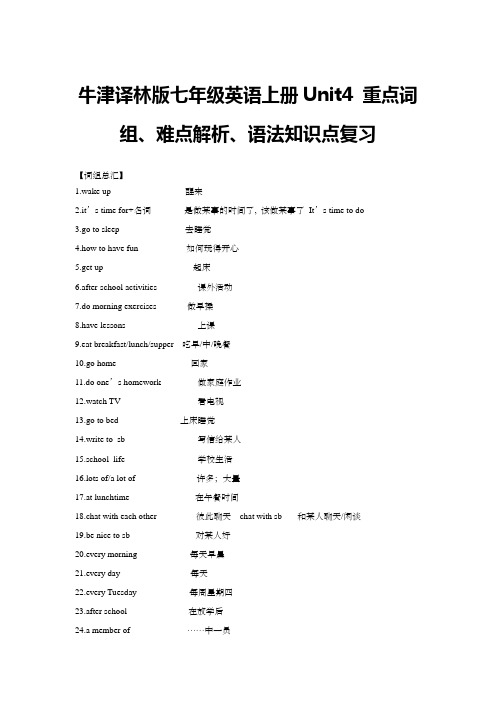
牛津译林版七年级英语上册Unit4 重点词组、难点解析、语法知识点复习【词组总汇】1.wake up 醒来2.it’s time for+名词是做某事的时间了, 该做某事了It’s time to do3.go to sleep 去睡觉4.how to have fun 如何玩得开心5.get up 起床6.after-school activities 课外活动7.do morning exercises 做早操8.have lessons 上课9.eat breakfast/lunch/supper 吃早/中/晚餐10.go home 回家11.do one’s homework 做家庭作业12.watch TV 看电视13.go to bed 上床睡觉14.write to sb 写信给某人15.school life 学校生活16.lots of/a lot of 许多;大量17.at lunchtime 在午餐时间18.chat with each other 彼此聊天chat with sb 和某人聊天/闲谈19.be nice to sb 对某人好20.every morning 每天早晨21.every day 每天22.every Tuesday 每周星期四23.after school 在放学后24.a member of ……中一员25.the Swimming Club 游泳兴趣小组26.have a good time 玩的开心27.email sb 给某人发电子邮件28.play games 玩游戏, 进行比赛29.twice a week 一周两次30.have fun 娱乐,乐趣;开心P.27-3031.listen to the radio 听收音机32.make a model plane 制作模型飞机33.read newspapers 看报read books 看书34.write emails 写邮件35.watch football matches 看球赛36.watch too much TV 看电视太多37.listen to music 听音乐38.listen to the teacher 听老师讲39.walk a dog 遛狗40.a piece of good news 一则好消息41.in the school football team 在学校足球队42.all the time 一直43.know (a lot) about…对……了解(很多)44.read comic books 看连环漫画书45.on the volleyball court 在排球场46.from...to…从……到……47.meet up with sb. 约见某人48.do their homework 做他们的作业49.under a big tree 在大树下50.go to one’s dancing lesson 去上舞蹈课51.have (no) time to do sth. 有(没有)时间做某事52.have a lot of new friends 有许多新朋友53.teach us English 教我们英语54.talk about…谈论关于……55.at home 在家56.say hello to…向……问好P.31-3757.the Class 1,Grade 7 students 七年级一班学生58.go on a trip 旅行, 旅游have one’s trip59.look at the posters 看海报60.more than 多于;超过61.twice a week 一星期两次62.the China Space Museum 中国航空博物馆63.the China Science and Technology Museum 中国科技博物馆64.next Monday 下周一65.each student 每个学生66.thank you for doing sth 为做某事而谢谢你anize the class trip 组织班级旅游68.I would like to+动词原形愿意干某事;想要干某事69.the price for………的价格70.be open/be closed 开着、关着71.look forward to…期盼;盼望72.enjoy…very much 非常喜爱……73.need to do sth 需要做……74.borrow a pen 借一支钢笔75.be busy doing 忙于做某事76.be good for 有益于77.help sb do sth 帮助某人做某事78.get ready for 准备……79.learn more about 更多了解……80.the answer to ………的答案81.the Computer Club 电脑兴趣小组【难点解析】1.Is it time for breakfast? 是吃早餐的时间了吗?it’s time for+名词, “是做某事的时间了, 该做某事了”=it’s time to+动词原形.例如:It’s time for class.是上课的时间了。
牛津译林初中七年级上册英语 Unit 4 My day Reading课件 (2)

▪ A.sing B.to sing C.singing D.sings
▪ lie is very nice __D___ her classmates and they all like her.
▪ A.of
B.from C.for D.to
Step 2 .
1. first adv. adj.
My classroom is on the _f_i_r_s_t_(one) floor. You should do your homework__B__before(在…之前)
you watch TV. A. one B. first C. then Sunday is the _f_i_rs_t_ (one) day of a week. Safety(安全) comes _f_ir_s_t_(one). ▪ wish n. wishes Teachers’ Day is coming, here’s a flower for you
• each other ---互相
• we often help _e_a_c_h___ o_t_h_e_r___.
• We 。should learn f_r_o_m__ e_a_c_h___oth__e_r____.
2. We practise after school on Wednesday afternoon.
school.
Describe what your ideal
school is like.
When
start lessons
go home
What
after class after school
What they are like teachers
牛津译林版七年级英语上册Unit-4单元知识点(重点短语、句型)
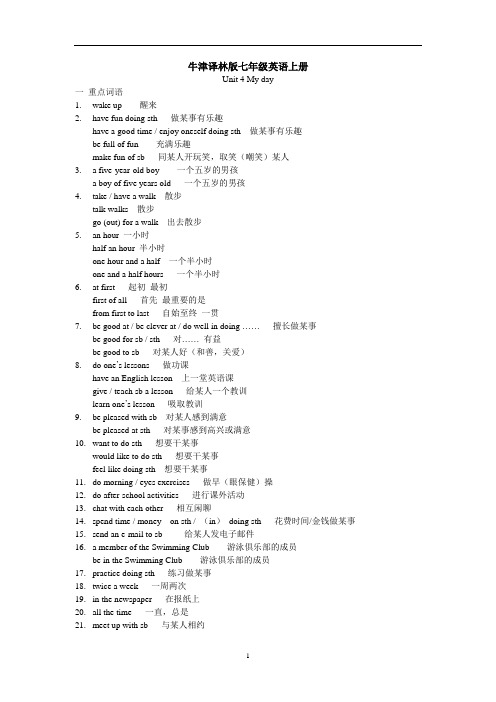
牛津译林版七年级英语上册Unit 4 My day一重点词语1.wake up 醒来2.have fun doing sth 做某事有乐趣have a good time / enjoy oneself doing sth 做某事有乐趣be full of fun 充满乐趣make fun of sb 同某人开玩笑,取笑(嘲笑)某人3. a five-year-old boy 一个五岁的男孩a boy of five years old 一个五岁的男孩4.take / have a walk 散步talk walks 散步go (out) for a walk 出去散步5.an hour 一小时half an hour 半小时one hour and a half 一个半小时one and a half hours 一个半小时6.at first 起初最初first of all 首先最重要的是from first to last 自始至终一贯7.be good at / be clever at / do well in doing ……擅长做某事be good for sb / sth 对……有益be good to sb 对某人好(和善,关爱)8.do one’s lessons 做功课have an English lesson 上一堂英语课give / teach sb a lesson 给某人一个教训learn one’s lesson 吸取教训9.be pleased with sb 对某人感到满意be pleased at sth 对某事感到高兴或满意10.want to do sth 想要干某事would like to do sth 想要干某事feel like doing sth 想要干某事11.do morning / eyes exercises 做早(眼保健)操12.do after-school activities 进行课外活动13.chat with each other 相互闲聊14.spend time / money on sth / (in)doing sth 花费时间/金钱做某事15.send an e-mail to sb 给某人发电子邮件16. a member of the Swimming Club 游泳俱乐部的成员be in the Swimming Club 游泳俱乐部的成员17.practice doing sth 练习做某事18.twice a week 一周两次19.in the newspaper 在报纸上20.all the time 一直,总是21.meet up with sb 与某人相约22.know a lot about computers 精通电脑23.go to the dancing lesson 去上舞蹈课24.be busy with / doing sth 忙于做某事25.have much time to do sth 有很多时间做某事26.say hello / goodbye to sb 向某人问好/道别27.go on a study-trip 进行一次学习旅行28.on each side of the street 在街道的每一边29.thank sb for doing sth 感谢某人做某事30.the price for ……。
七年级上册英语Unit 4 My day Reading知识点梳理-译林版
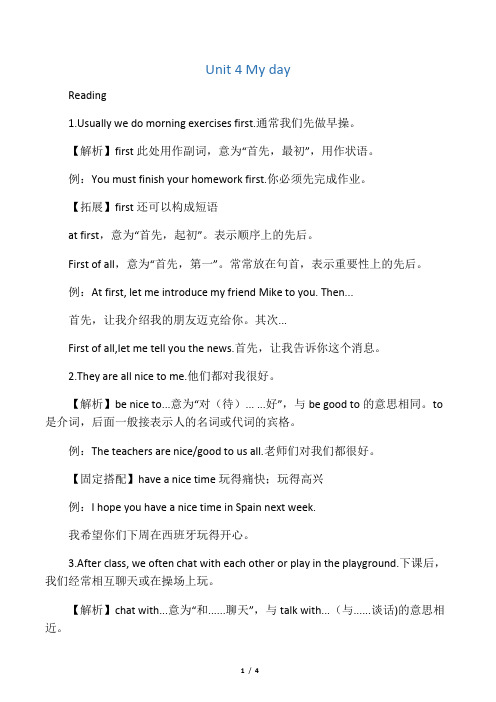
Unit 4 My dayReadingually we do morning exercises first.通常我们先做早操。
【解析】first此处用作副词,意为“首先,最初”,用作状语。
例:You must finish your homework first.你必须先完成作业。
【拓展】first还可以构成短语at first,意为“首先,起初”。
表示顺序上的先后。
First of all,意为“首先,第一”。
常常放在句首,表示重要性上的先后。
例:At first, let me introduce my friend Mike to you. Then...首先,让我介绍我的朋友迈克给你。
其次...First of all,let me tell you the news.首先,让我告诉你这个消息。
2.They are all nice to me.他们都对我很好。
【解析】be nice to...意为“对(待)... ...好”,与be good to的意思相同。
to 是介词,后面一般接表示人的名词或代词的宾格。
例:The teachers are nice/good to us all.老师们对我们都很好。
【固定搭配】have a nice time玩得痛快;玩得高兴例:I hope you have a nice time in Spain next week.我希望你们下周在西班牙玩得开心。
3.After class, we often chat with each other or play in the playground.下课后,我们经常相互聊天或在操场上玩。
【解析】chat with...意为“和......聊天”,与talk with...(与......谈话)的意思相近。
例:Do you often chat with your friends?你经常和你的朋友们聊天吗?【解析】each other相当于代词,表示相互关系,意为“互相,彼此”。
七年级上册英语Unit 4 My day Reading知识点梳理-译林版
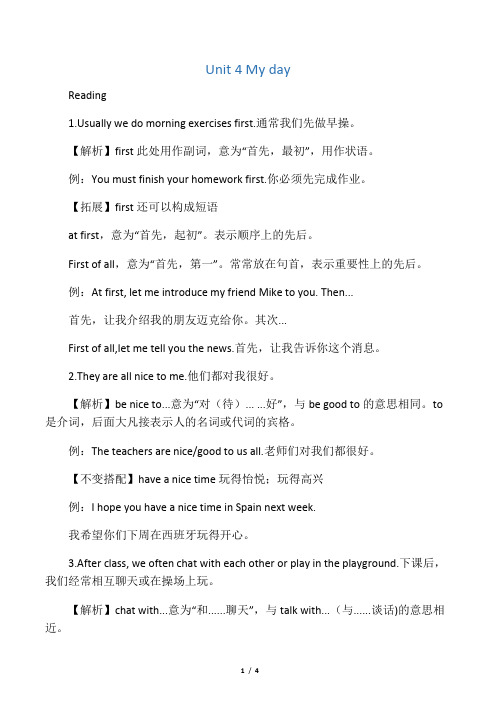
Unit 4 My dayReadingually we do morning exercises first.通常我们先做早操。
【解析】first此处用作副词,意为“首先,最初”,用作状语。
例:You must finish your homework first.你必须先完成作业。
【拓展】first还可以构成短语at first,意为“首先,起初”。
表示顺序上的先后。
First of all,意为“首先,第一”。
常常放在句首,表示重要性上的先后。
例:At first, let me introduce my friend Mike to you. Then...首先,让我介绍我的朋友迈克给你。
其次...First of all,let me tell you the news.首先,让我告诉你这个消息。
2.They are all nice to me.他们都对我很好。
【解析】be nice to...意为“对(待)... ...好”,与be good to的意思相同。
to 是介词,后面大凡接表示人的名词或代词的宾格。
例:The teachers are nice/good to us all.老师们对我们都很好。
【不变搭配】have a nice time玩得怡悦;玩得高兴例:I hope you have a nice time in Spain next week.我希望你们下周在西班牙玩得开心。
3.After class, we often chat with each other or play in the playground.下课后,我们经常相互聊天或在操场上玩。
【解析】chat with...意为“和......聊天”,与talk with...(与......谈话)的意思相近。
例:Do you often chat with your friends?你经常和你的朋友们聊天吗?【解析】each other相当于代词,表示相互关系,意为“互相,彼此”。
Unit4MyDay(知识梳理)-七年级英语上册精品课堂(牛津译林版)

Unit 4 My day 一、重点词组二、重点语言点1. wake upwake 常作及物动词,意为“使醒来,唤醒” Please wake me up at seven o’clock.wake作不及物动词,意为“醒,醒来” He woke three times during the night.当wake up意为“叫醒”时,要注意宾语的位置。
如果宾语是人称代词,通常位于wake和up之间。
如果宾语是名词,则既可以位于wake和up之间,也可以位于wake up之后。
wake up your dad=wake your dad up wake me up2. It’s time for ...It’s time for sth = It’s time to do sth 该是做某事的时候了It’s time for lunch. = It’s time to have lunch. 该是吃午饭的时候了。
It’s time for sb to do sth 该是某人做某事的时候了。
It’s time for the children to go to bed. 该是孩子们上床睡觉的时候了。
3. Shall we go walking in the hills?【精讲】Shall we...?意为“我们……好吗?”,shall用于第一人称,表示提出或者征求建议,常用Good idea.或者Sounds great.来回答。
4. go outgo out 外出;出去;熄灭;过时Let's go out on Saturday night. 我们星期六晚上出去吧。
Let's go out for some fresh air. 咱们出去呼吸点新鲜空气。
The bedroom light went out after a moment. 卧室的灯片刻后熄灭了。
The fire seemed to be going out. 火看来快熄灭了。
第4单元my day

just
正好;恰好 /dʒʌst/
8
museum
博物馆 /mju:'ziəm/
9
never
从不 /'nevə(r)/
10
picnic
野餐 /'pɪknɪk/
11
have breakfast
吃早餐
12
have dinner
吃晚饭
13
have lunch
吃午饭
14
learn
学;学习;学会 /lɜ:(r)n/
玩得高兴
49
have fun
尽情玩
50
have lessons
上课
51
be late for
迟到
52
get ready for sth
为……准备好
23
shall
表示征求意见 /ʃæl, ʃəl/
24
life
n.生活;生命 /laɪf/
25
lives
n.(pl.)生活;生命 /laɪvz/
26
past
prep.晚于;过(时间)adj.过去的 /pɑ:st/, /pæst/
27
quarter
n.一刻钟;四分之一 /'kwɔ:(r)tə(r)/
28
第4单元my day
第4单元My day_译林版七年级英语上册单词听写_单词表
第4单元My day
1
hill
山丘;小山 /hɪl/
2
go to bed
上床睡觉
3
first
(1st)第一的 /fɜ:(r)st/
4
wake up
叫醒
5
roller skating
牛津译林版-英语-七上-4单元 My Day 复习课件
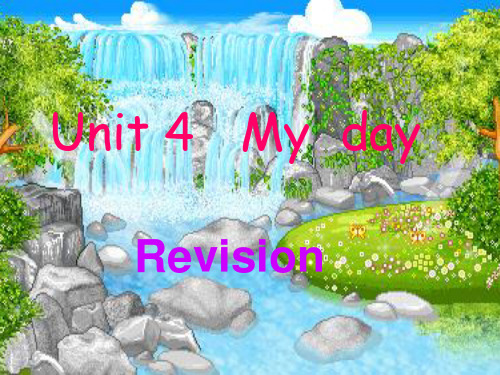
13. have much time to talk with her friends → have (no) time to do sth (没) 有时间做某事
14. teach us English → teach sb+科目, 教某人某科目(注意不能用物主代词)
〈用法拓展〉⑴teach oneself sth自学…⑵ teach sb (how) to do sth教某人(如何)做 某事
15. say hello to her向她问好,问候她
〈知识链接〉①say hello to sb=greet sb 向某人问好 ②say yes to sb=agree with sb同意某人(的意见) ③say no to sb= refuse…拒绝 ④say thanks to…感谢… ⑤say goodbye to…向…告别 ⑥say congratulations to …=congratulate… 向…祝贺
• 一。时间的介词at/ on/ in
at: 1.钟点 I get up at six. 2. 部分节日People give presents at Christmas. 3. 年龄I go to school at six.
On: 1. 周几或部分节日I go to the library on Sunday. 2. 具体日期 His birthday is on January 1st.
• 16. get ready for the day为一天(的工作 或学习)做好准备
• 〈知识链接〉⑴get ready for sth,be ready fo you help me get everything ready for the party? 你能不能帮我把这次聚 会准备妥当?
牛津译林初中七年级上册英语 Unit 4 My day Comic strip课件

Eating and Sleeping.
3. What would Hobo like to do?
He would like to go walking in the hills.
4. What does Hobo think of some dogs? They just don’t know how to have fun.
What time do you get up? What do you do at 9 am.? What time do you have your first class? When do you do your homework? When do you go to bed? What do you do at 6:30 pm.? …
She _e_a_t_s_ supper at 6:30 p.m. At 7:00 p.m. she _w_a_t_ch__e_s TV. She _d_o_e_s_ her homework at 7:30 p.m.
At 9:30 p.m. she _g_o_e_s_ to bed.
Please talk about your own daily activities with your partner. Ask and answer questions as below:
Task 2: Read after it!
Task 3:
Work in pairs and act it out.
Let’s see Eddie’s Day:
have breakfast go to sleep have lunch go to sleep
牛津译林初中七年级上册英语 Unit 4《My day Integrated skills》课件1
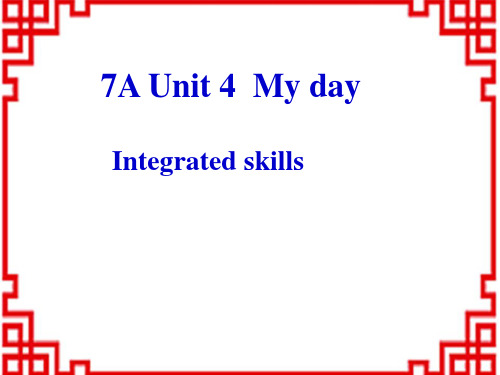
Open: Every day except Thursday
CCTV Tower
Location: 32 Dong Sanhuan Zhong Lu, Docheng District
Price: ¥20 Open: Every day
Boys and girls: Enjoy your trip! Enjoy your school life!
1.Do you like pandas? 2.How much money
will you spend?
5 yuan 3.Can yoWu’s note on page 31, find out answers to the questions.
They will have the trip Each student can
next Monday
spend ¥10
Where will they go?
Help Millie complete her note to Mr. Wu.
▪ Dear Mr. Wu
▪ Thank you for organizing the class trip. We would like to go to _Be_iji_ng_Z_oo in _Xi_ch_en_g _Di_str_ict. The price for each student is _¥_5__. The _zo_o_ is open from _7.3_0_a._m._ to 5_.0_0_p._m._.
Miss Shen
Fill in the blanks
be closed,look forward to,have a good time, would … like,have a class trip,
牛津译林版-英语-七上-4单元 My Day 单词、短语和句子
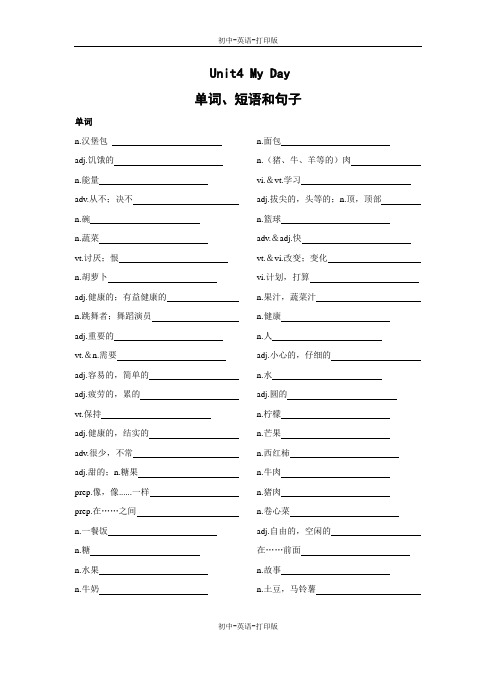
Unit4 My Day单词、短语和句子单词n.汉堡包adj.饥饿的n.能量adv.从不;决不n.碗n.蔬菜vt.讨厌;恨n.胡萝卜adj.健康的;有益健康的n.跳舞者;舞蹈演员adj.重要的vt.&n.需要adj.容易的,简单的adj.疲劳的,累的vt.保持adj.健康的,结实的adv.很少,不常adj.甜的;n.糖果prep.像,像......一样prep.在……之间n.一餐饭n.糖n.水果n.牛奶n.面包n.(猪、牛、羊等的)肉vi.&vt.学习adj.拔尖的,头等的;n.顶,顶部n.篮球adv.&adj.快vt.&vi.改变;变化vi.计划,打算n.果汁,蔬菜汁n.健康n.人adj.小心的,仔细的n.水adj.圆的n.柠檬n.芒果n.西红柿n.牛肉n.猪肉n.卷心菜adj.自由的,空闲的在……前面n.故事n.土豆,马铃薯n.(shelves)架子n.(knives)刀;餐刀n.绵羊n.小包;(一)包n.盐n.茶n.千克,公斤vt.买n.祖父;外祖父n.瓶子n.面条少于n.饼干n.分数;点vi.躺、卧;说谎vi.觉得,感到n.运气n.超级市场,超市vt.搬运,运输;携带n.花生n.汤prep.没有,不n.清单n.日常饮食n.零食n.可口可乐n.能量n.长沙发n.数量n.生活方式溜旱冰n.纸盒;牛奶盒;糖果盒int.哇,哇塞n.问卷n.祝贺n.搭档,合作伙伴adv.总体上说n.卡,拉里路(热量单位)n.维他命,维生素短语重点词组1. 想要成为一名舞蹈者_________________2. 变累______________________________3. 改变饮食___________________________4. 早饭吃一些面包____________________5. 一名顶尖学生_______________________6. 快餐______________________________7. 冰淇淋_____________________________8. 一点也不__________________________9. 吸收、摄取_________________________ 10.保持苗条_________________________ 11.每周两次_________________________ 12.计划做某事_________________________三、句型结构1. It’s important for a dancer to be healthy. (it 作为形式主语,用动词不定式作真正的主语)e.g. 1) 对于我们而言学好英语很必要。
2023牛津译林版七年级上册Unit 4《My day》(Reading I)课件

After-school activities
Paragraph 2
When does Millie’s school start?
At eight in the morning.
They always chat with each other or play in the playground.
read books
do after-school activities
practise playing volleyball
chat with each other
have a good time
Which is Millie’s favourite subject?2. What does Millie like doing?
a lot of
chat
Reading CБайду номын сангаасub
Tuesday
Thursday
J: Does Millie like sports?T: Yes. She likes playing volleyball. She’s in the school _____________. They _______ after school on ___________________.
volleyball team
practise
Wednesday afternoon
Try to retell Millie’s day
Time
Events
8:00 a.m.
do morning exercises
Millie likes her school very much.
2. School starts at 8:15 at Millie’s school.
新牛津英语译林版七年级上册各单元全部重点短语和句子

7A 短语和句子n.名词v.动词vt.及物动词vi.不及物动词adj.形容词adv.副词prep.介词pron.代词conj.连词Unit 1 This is me1.look after sb. 照顾某人2.some of the new students 新学生中的一些one of + 可数名词复数…..中的一个many of + 可数名词复数…..中的许多.much of + 不可数名词…..中的许多3.love doing…. 热爱/喜爱做….like doing….喜爱做….enjoy doing…. 喜欢/享受做…sb. do sth. 让某人做某事5.make sb. do sth. 使某人做某事使役动词let, make后面接省to的动词不定式充当宾语补足语、6 like sports 喜爱运动7 after class 课后in class 在课上8. be good at doing…… 擅长做某事=do well in doing……my new friends 见见我的新同班同学there 在那边11. tell sb. about sth. 告诉某人关于某事12. Oh, I see. 哦,我明白了;13. wear glasses 戴着眼镜14. like all the lessons 喜欢所有的功课15. need作为行为动词的用法:need to do don’t / doesn’t need to do16.twelve years old 12岁17. \come from 来自于句子:1.How to look after your e-dog.如何照顾你的电子狗;2.I have short hair. = My hair is short. 我短发;3.Let’s meet my new classmates. 让我们见见我的新同学;4. She is tall and slim. 她高而苗条;5. Daniel is from Nanjing. Daniel来自南京;=Daniel comes from Nanjing.6. She loves dancing. 她热爱舞蹈;7. She is good at swimming. 她擅长游泳; = She does well in swimming.8. This is my cousin Andy. 这是我的表弟Andy.9. Andy, this is my new classmate Kitty. Andy, 这是我的新同学Kitty.10. I come from Nanjing, but now I live with my family in Beijing.我来自南京,但现在我和父母住在北京;11. They are all very nice. 他们都很好;Unit 2 Let’s play sports1. play sports 做运动 6. Walk to my bowl 走到我的碗边2. like walking 喜欢散步go for a walk 去散步take a walk 散步3. enjoy oneself = have a good time 玩得开心= have fun = play happily4. be free 有空be busy 繁忙5. hope to do sth. 希望做某事hope that + 句子希望+ 宾语从句7. come true 梦想实现,成为现实8. at/on weekends = at / on the weekend 在周末9. of course = certainly = sure 当然10. Many of my students 我的许多学生11. else 放在不定代词或疑问代词之后something else 别的东西what else 别的什么,还有什么12. a lot of = lots of 许多修饰可数名词、不可数名词some 一些修饰可数名词、不可数名词many 许多修饰可数名词much 许多修饰不可数名词13. fun 不可数名词乐趣、享乐、有趣的事What great fun 多么有趣的事啊14. talk about 谈论talk of 谈到,说到15. hero – heroes16. many times a day 一天很多次once a week 一周一次twice a month 一月两次tree times a year 一年三次17.my favourite football player 我最喜爱的足球队员18. a new member of Huanghe Football Club黄河足球俱乐部的一个新成员19. look strong 看起来强壮20. play football very well 足球踢得很21. in one’s free time 在某人的空余时间里22. enjoy listening to music 喜欢听音乐23. make sb. do sth. 使某人做某事make sb. + adj. 使某人……make him happy 使他们开心make me sad 使我悲伤24. activity ---- activities 活动25. watch ball games on TV 在电视上看球赛26. 对sometimes, often, usually, always, never, once a week, twice a month等表示频率的词或短语提问用how often / how about ……怎么样句子:1. Are you free = Do you have time 你有空吗2. What’s your favourite sport 你最喜欢的运动是什么3.He also enjoys listening to music. 他也喜欢听音乐;4. Li Hua wants to play in the next World Cup. 李华想参加下届世界杯;5.I hope his dream comes true. 我希望他的梦想实现;6.How does he look 他看上去怎样What does he look like 他看上去像什么7. Do your parents go with you你父母和你一起去吗8. My dad sometimes watches our games. 我爸爸有时候观看我们的比赛;9. My mum often shops at weekends. 我妈妈常在周末购物;10. I often stay at home. 我常待在家里;11. Many of my students like sports我学生中的许多喜欢运动;/我的许多学生喜欢运动;12. What else do you like to do你还喜欢做别的什么事吗13. It makes me feel great. 它使我感到很棒;14. I like reading too. 我也喜欢阅读;15. Me, too. Reading is fun. 我也是;阅读很有趣;16. I often play basketball with my friends after school. 我常在放学后与朋友一起打篮球;Unit 3 Welcome to our schoolthe Open Day 在开放日 2. be ready to do…. 准备好做….parents’ meeting 家长会4. at the school gate=at the gate of the school在学校大门口5. so big 如此大6. watch two of our lessons 观摩我们的两节课7. let me show you around 让我带你参观the ground floor 在一楼英9. this way 这边走10. by the way 顺便说说,顺便问一下11. have a meeting / have meetings at the school hall 在学校礼堂开会12. classroom building 教学楼14. be nice / kind to sb. 对某人好15. It’s very nice/kind of you to do sth.你做某事真好a diary diaries 写日记17. want to say hello to sb. 想向某人问好18. say goodbye to sb. 向某人告别say sorry to sb. 向某人道歉19. get to school 到达学校20. take the bus to school 乘公交车上学=go to school by bus=go to school on a / the bus21. ride a bike to school 骑自行车上学=go to school by bike=go to school on one’s bike23. live near the school 住学校附近24. live far away from the school 住得远离学校25,all kinds of books 各种可样的书26. borrow sth. from sb. 跟某人借某物27. borrow books from the library从图书馆借书28. on one’s way back 在某人回来的路上29. on one’s way home 在某人回家的路上30. on one’s way to school 在某人上学的路上31. Thank sb. for sth. 因为某事谢谢某人32. Thank sb. for doing sth. 为干某事谢谢某人you / Thanks for telling me how to have a party.谢谢你告诉我怎样举办一个晚会;34. all the best 一切顺利,万事如意35. write to sb. 给某人写信=write a letter letters to sb.句子:1. What’s your favourite subject=What subject do you like best2. Which of the subjects do you like best 这些科目中你最喜欢哪个’s the date today 今天几号=What date is it today’s that man in a white shirt 穿白衬衫的那个人是谁5. Our school is really nice. 我们学校真好;6. I can’t hear you well on the phone.在电话里我听不清你的话;7. It’s a long way from my home to the school.从我家到学校有很长一段路;8. The reading room is open. 阅览室是开着的9. ----When is it open 它什么时候开放-----It’s open from 8 . to 5:30 它从早上8点到下午5点半开放;10. It takes me about an hour to get to school.我到达学校大约要花费一个小时;11. What school do you study at你在哪个学校学习Unit 4 My day1. wake up 醒来2. between...and... 在...和...之间3. It’s time for sth. It’s time for sb. to do sth. 是某人干某事的时候了4. go walking in the hills 去山上散步5. seldom go out 很少外出6. need a good rest 需要好好休息=need to have a good rest7. need to do sth. 需要做某事8. From Monday to Friday 从周一到周五9. do morning exercises 做早操10. do eye exercises 做眼保健操11. do some exercise 锻炼12. have lessons 上课13. start begin lessons 开始上课14. do after-school activities 做课外活动15. be never late for work / school 上班/ 上学从不迟到16. one of ….. …….之一;后接可数名词复数17. be all nice to sb. 都对某人很好18. chat with sb. 和某人聊天19. chat with each other 互相聊天20. help each other 互相帮助21. play in the playground 在操场上玩22,be in the school volleyball team是校排球队成员=be a member of the school volleyball team23. practise after school 放学后训练practise doing sth. 练习/训练做某事24. on Wednesday afternoon 在周三下午25have a good time doing sth=have fun doing sth. 做某事过得愉快26. in spring / summer / autumn / winter 27. at 6 years old =at the age of 6 在六岁28. all the best 一切顺利,万事如意29. have much time to do sth. 有很多时间做某事30. have no time to do sth. 没有时间做某事31. go to her dancing lessons 去上舞蹈课32. dance for half an hour 跳舞半小时33. go roller skating 去溜旱冰34. visit a museum 参观博物馆on picnics with my family twice a month 一个月两次和我家人去野餐36..be good for sb. 对...有益37..be bad for sb. 有…..害38. get ready for sth 为...做好准备get ready to do sth 准备好做某事=be ready to do sth.39.. learn a lot about sth 关于某事了解很多40.. learn more about sth. 关于某事了解更多41. too much homework 太多作业42. too many lessons 太多课43. much too cold hot太冷热句子:1. Some dogs just don’t know how to have fun. 有些狗就是不知道怎样玩乐;2. What time do you start lessons 你们什么时候开始上课3. Our lessons begin at a quarter past eight. 我们的课于8:15开始;4.We have a Reading Club. 我们有一个阅读俱乐部;5.I also like playing volleyball. 我也喜欢打排球;6. We always have a good time at school.我们在学校总是过得很开心;7. Millie seldom chats with her friends after 很少与朋友在课后闲聊;8. I would like to tell you about my life here我想告诉你我在这儿的生活;9. We do not have lessons on Saturday or Sunday. 我们在周六和周日不上课;10. How often do they exercise 他们多久锻炼一次11. I hope everyone can come and watch the game. 我希望每个人能来看比赛;Wish our team good luck 祝我们队好运They help us get ready for the day他们帮助我们为一天做好准备;Unit 5 Let’s celebrateup 打扮 2.. dress up as a ghost 乔装打扮成鬼a guess 猜一猜 4. at Christmas = on Christmas Day 在圣诞节Festival中秋节 6. enjoy the full moon赏满月7. knock on / at people’s doors 敲人们的门8. play a trick on sb. / play tricks on sb.捉弄某人9. seem + adj. He seems very happy. seem to do… He seems to be very happy.He seems to like apples. It seems that + 句子; It seems that he is very happy. 他似乎很开心;10. be different from… 与…不同11 wear masks 戴面具12. have a party 开派对13. learn about different festivals around the world 了解全世界不同的节日14. a special day 特别的一天15. make pumpkin lanterns 做南瓜灯16. make lanterns out of pumpkins 把南瓜做成灯houses 串门18.. play a game with the people inside和里面的人做一个游戏dance 舞狮out 找到,发现 a lot of photos 拍很多的照片the world = all over the world全世界23. paint one’s face 给脸涂色24. on the evening of….. 在…..的晚上us some candy as a treat 给我们一些糖果作为招待= give us a treat of candy26 fun 不可数名词much fun 很多乐趣have lots of fun = have great fun 玩得开心What great fun 多么大的乐趣27. on Halloween 在万圣节前夕28. at a restaurant near my home 在我家附近的一家餐馆29. some other nice things 一些别的好东西30. what other things = what else 别的什么东西31. on the radio 在收音机里32 let off fireworks 放烟火33. watch the fireworks 看烟火34. a music and dance show一场音乐舞蹈表演35. most Chinese families 大多数中国家庭36.. at this time of year 在一年的这个时候句子1. Let’s celebrate. 让我们庆祝;2. What is your favourite festival =What festival do you like best 你最喜欢的节日是什么3. All my family get together and have a big dinner. 我所有的家人聚集在一起吃大餐;4. Thank you for telling me about the Mid- Autumn Festival. 谢谢你告诉我中秋节的情况;5. Children have lots of fun on that day. 在那天孩子们有很多的乐趣;’s really a special day. 这真是特殊的一天;7. Family members get together and give each other presents. 家庭成员聚集在一起并互送礼物;8. How do you usually celebrate your birthday 你通常怎样过生日9. What do you get as birthday presents 你得到什么作为生日礼物10. The Spring Festival is an important festival in China. 在中国春节是个重要的节日;11. I am on holiday in New York. 我在纽约度假;12. What do you do to celebrate the Chinese New Year in Beijing 你们在北京做什么事庆祝春节13. There is a great Spring Festival Gala on TV every year. 电视上每年都有盛大的春节联欢晚会;14. Children have lots of fun on this day. 孩子们在这一天玩得很开心;15. Usually our parents get new clothes ready for us. 我们的父母为我们准备好新衣服;16. We get red packets from our parents. 我们从父母那得到压岁钱;17. They are really wonderful. 他们真的很精彩Unit 6 Food and lifestyle1. all kinds of food 各种各样的食物2. keep fit = keep healthy 保持健康……away 远离4. plan to do… 计划做…planning5. more than 超过,多于6. dance for half an hour every day每天跳舞半小时7. feel hungry between meals在两餐之间感到饿8. Too much sugar 太多糖my lifestyle 改变我的生活方式swimming pool 一个游泳池11. four kilos of meat 四公斤肉12. five cartons of milk 五盒牛奶13. how to keep fit 如何保持健康14. less than 3 times a week 少于一周三次three to six times a week 一周三到六次15.exercise more 多运动16.eat less 少吃17.Have a look 看一看18. take a walk 散步19. All right,好的,行the day well 很好的开始一天21. taste good 尝起来不错;此处taste 为系动词22.. have a healthy lifestyle 有一个健康的生活方式句子1. It’s good for our health. 这对我们的健康有益;2. Healthy food is important for me.= It’s important for me to have healthy food.健康食物对我很重要;/对于我来说吃健康食物很重要;3. They have too much sugar and are bad for my teeth. 他们有太多的糖并对我的牙齿有害;4. I need to change my lifestyle now. 现在我需要改变我的生活方式;5. I plan to eat more fruit and vegetables every day. 我计划每天吃更多水果蔬菜;6. You need to exercise more and eat more healthy food.你需要多加锻炼并多吃健康食品;7. I seldom eat cakes or sweets. 我很少吃蛋糕和糖果;7. Let me have a look at the menu. 让我看一看菜单;8. What would you like to order 你们想要点什么9. Apple juice tastes good. 苹果汁尝起来不错;10. I often play football to keep fit. 我常踢足球保持健康;helps me start the day well. 这帮助我很好的开始一天;12. This meal gives me energy for the whole afternoon. 这顿饭为我整个下午提供能量;13. We need them to keep healthy. 我们需要他们来保持健康;14.. An apple a day keeps the doctor away. 一天一苹果,医生远离我;Unit 7 Shopping1. come with me 跟我来2. need sb. to do sth. 需要某人做某事3. flower / shoe /gift shop 花/鞋/礼品店clothes / sports shop 服装店/体育用品商店4. go shopping = do some shopping = buy some things 购物/买东西5. hate doing…/ hate to do…. 讨厌做….6. be interested in doing sth. 对做…感兴趣the street 沿着这条街8. be sure 确信、相信9. just a minute = wait a minute = wait a moment = wait for a short time 稍等片刻10.enough修饰adj./adv.时喜欢放在后good enoughenough修饰n.时常放在前面enough moneyall the bags 拎所有的包12. wait for….. 等待…13. be different from… 与….不同14. the same as…. 与…一样15. another 又一,另一,用于三者或以上a look看一看much 多少钱18. price用高、低high, low形容,不用贵、便宜形容19. . buy Simon a present 买给西蒙一个礼物= buy a present for Simon 为西蒙买一个礼物20. last year’s cards 去年的卡片21. different kinds of hair clips 不同种类的发卡22. go well with… 与…很配23. help the children in some poor areas帮助一些贫困地区的孩子24. walk a long way to school 走很长的路上学25. try on 试穿26. one floor of restaurants 一个楼层的饭馆27.. on the top floor 在顶楼句型1.There’s a new mall down the street.沿着这条街走有一个新建的大型购物中心;2.What can I help you/Can I help you您需要什么3.How much do they costHow much are they他们多少钱’ll take /buy them.我就买它们;5.. Not far away from my school, there is also a supermarket. 离我学校不远也有个超市;need books most. 他们最需要书;7.. We can use our pocket money to buy them these things. 我们可以用零用钱买给他们这些东西;8. Thank you for your help. 谢谢你的帮助;9.. What’s your size Size 40. 你穿几码40码;10.. They fit very well. 他们很合适;11. Can we see another pair 我们可以再看一双吗12.. There are five floors of shops. 有五层楼的商店;13. There are foods from different areas. 有来自不同地区的食物;14.. The mall is a good place to meet friends and have fun.这个购物中心是与朋友见面和玩乐的好地Unit 8 Fashion1. spend +时间/钱+ on sth. 花时间/钱在..上.spend +时间/钱+ in doing sth.花时间、钱做某事2. so lazy 如此懒惰3.. sports clothes 运动服4. lend sth. to sb. = lend sb. sth.把某物借给某人5.. borrow sth. from sb. 跟某人借某物6.. between ….and …在...与…之间用于两者之间7. be made of… 由….制成能看出原材料be made from…由….制成不能看出原材料be made in + 地点产于某地be made by + 人被…制造8.下列的fit 为adj. be fit for …. 适合于…They are fit for a long walk. 他们适合长时间步行14. 下列fit为v. They fit me very well. 他们很适合我;The coat doesn’t fit me.那件外套不适我;15. ten more minutes = another ten minutes 再多10分钟16. hold / have/ give a fashion show 举办一个时装展17. design a poster for the “Fashion Wall”给Fashion Wall设计一张海报18. show you different styles of clothes给你看不同式样的衣服19. look smart / modern and beautiful 看起来时尚和漂亮20.. look great in white创白色很棒21. both of them 他俩都22. a black wool skirt 一件黑色羊毛短裙23. a pair of long red leather boots 一双红色长筒皮靴24. 感叹句的构成:1、What + n.短语+ 主语+ 谓语What a great show it is 这是多棒的表演啊What tall buildings they are 他们是多高的楼啊What fine weather it is 这是多好的天气啊2、How + adj./adv. + 主语+ 谓语How great the show is 表演多棒啊How tall the buildings are 这些楼多高啊How fine the weather is 天气多好啊25.most young people 大多数年轻人26. wait for the school bus 等校车27. lie on the bed 躺在床上28. go for a dinner 去赴宴29. have to do sth. 必须/不得不做某事30. feel soft and smooth 摸上去柔软光滑句型1. What do you think of …. = How do you like ….. 你认为….怎么样2. I’m thinking about what to wear. = I’m thinking about what I should wear.我正考虑穿什么3. I can spend ten more minutes in bed then. 那么我可以在床上多待10分钟了;4. Would you like one more apple = Would you like another apple 你想再要一个苹果吗5. Can you lend us your red blouse for our fashion show, Mum妈妈,你能把你的红衬衫借给我们参加时装表演吗6. What size is your blouse Size 4. 你的衬衫是什么尺寸大小4;7. Trainers are light and comfortable and are popular among young people.8. Here comes Simon. 西蒙走来了;9. That’s all for today’s show.= So much for today’s show. 今天的表演到此结束;for coming. 感谢光临;11. You look great in your purple shirt. 你穿紫色衬衫看起来棒;12. The purple shirt looks great on you. 紫色衬衫穿在你身上看起来棒;13. That pair of long boots is made of leather. 那双长靴是皮革制成的;14. The jacket is not too long or too large. 这夹克不太长也不太大;15. My design includes a pair of blue jeans. 我的设计包括一条蓝色牛仔裤;。
牛津译林版七上 Unit 4 My day教案

Unit 4 My day Teaching aims1.Learn to talk about daily activities in English2.Learn the new wordsStep 1. Lead-in1.What time do you usually get up?2.When do you go to school every day?Step 2. PresentationLearn some new words•wake up 醒来•seldom adv. 很少•need vt&n需要•have fun 玩得高兴•activity 活动•homewok 家庭作业•usually adv. 通常•start vt&vi开始•quarter n.四分之一•past perp.经过•never adv.从不•be late for 迟到Step 3 Look and answerWhat is Eddie doing?Ste p 4 Listen and anwer1 .What is Hobo doing?2. What does Eddie do after breakfast?3. What does he do after lunch?4. What does he do after lunch?Step 5 Read and actFree Talk:Do you want to be a lazy student?Step 6 Ask and answer1.What do we often do at school?2.What do we do at home?do morning exercise s have lessonsdo after-school activities get upeat breakfast/lunch/supper go to beddo homework watch TVStep 7 Look at Millie’s dailyStep 8 Let’s have a talk-- What time does Millie get up?-- She _____________________-- What does she do at 7.30 a.m.?-- She _____________________Step 9.Talk about your daily activities:1.Finish the form on page 43.2.Try to say something about your own daily activities like that:Hi, I’m _______. I’m _____ years old.I study at _______________. I __________. In the morning, I ____________________Step 10.Listen and answer1.When does Millie go to school every day?2..What time does Millie start lessons every day?Step 11.Read and actStep nguage pointsStep 13.Exercises:1.翻译下列词组2.用所给词的适当形式填空3.选词填空4.完成下列句子Homework1. Act the conversation in pairs after class.2. Preview the new words in Reading.ReadingTeaching aims:1. Identify specific information about school life and activities2. Practise reading skills by learning Millie’s article.3.Learn the new wordsStep 1 Lead-inA story about FrankStep 2. Discussion1.Do you like your school?2.What do you think of your school life?3.What do you often do at school?Step 3.Talk about your school life1. What do you think of your school?2. When does your school day start?3. Do you do morning exercises at school? When?4. When do you begin your lessons?5. What are your favourite lessons?6. What is your favourite sport?Step 4.Read and learn some new wordsin the morning/afternoon/evening 在上午/下午/晚上favourite adj.最喜爱的from…to… 从…到…first adv. 首先chat vi.聊天practise vt/vi练习have a good time 玩得高兴best a dj./ad v. 最好的wish n.祝愿Step 5.Read and answerW hich is Millie’s favourite subject?Step 6 Finish B1 and B2 then check answersStep 7 Read after the tape then finish more exercisesStep 8 Finish B3 and C then check answe rsStep 9 Phrases and language points in the articleStep 10TaskRetell Millie’s school lifeStep 11 Interview then give a short speechbe a student at, start , from…to…, do morning exercises, lessons begin, favourite subject, be good atfriends, be nice to, chat withlibrary, a Reading Club, read books, like playing volleyball , be in,have a good timeStep 12 HomeworkWrite about your school lifeGrammarTeaching Aims:.Learn the use of prepositions of time and adverbs of freque ncyStep1 Lead-inIt is very cold in winterChildren’s Day i s on June 1st.They do morning exercises at 8 o’clockStep2 Present the use of preposition of timeWe use in before parts of the day、 months 、seasons、 years.We use on before days、 dates 、special holidays、 parts of a special day.We use at before time of day、 age.Step3 Explan the use of preposition of timein 用于泛指一天的各个部分,月份,季节及年份on用于表示具体的某一天at用于表示具体钟表上的时间、年龄Step4 ExercisesFinish the exercises on page 47 then check answers.Fill in the blanks with in、 on、 atStep5 Present the adverb of frequencynever 、 seldom 、 sometimes 、 often 、 usually 、 alwaysStep6 Look at the pictures and fill in the blanks.频率由高到低为 always usually often sometimes seldom neverStep7 Complete the exercises on page 48 then check answers.Step8 Work in pairs and talk about your diets.•What do you have for breakfast/ lunch/ dinner?•I always/ usually/ often/ sometimes/ seldom/ never have…for my breakfast/ lunch/ dinner.•Do you always/ usually/ often/ sometimes/ seldom/ never have… for…?•What about you?Step9 Finish more exercises一根据首字母及句意思补全单词二对画线部分提问三比较下列句子Step10 Homework1. Remember the new words in this lesson.2. Finish all the exercises about grammar.Integrated skillsTeaching aims:1. Learn about something about volleyball matches2. Practise listening skills by listen to a conversation.Step1 RevisionStep2 Free talkWhich sport do you like best? Why?Step3 PresentationIf you want to watch a match,you should know the following four questions.•What are the teams in the match?•When is the match?•Where is the match?•How can we go to watch the match?Step4 Exercises1. Listen and TickFinish the exercises on page 49 and the check answers2. Listen anf FillListen again and complete Millie’s notes(P49 A2&P50 A3)Step5 Explanationhope to do sth/ hope+从句Step6 Homework1) Learn new words and phrases by heart.2) Preview next lesson.Speak up and Study skillsTeaching aims:1.Practise speaking skills by talking about an activity at school.2.Learn some vowels.Step 1 Presentation1、Listen and answer:What are they talking about?2、Read and answer1)Is there a football match this Saturday afternoon?2)Where does Millie have the match?3)How often does Millie have this kind of match?4)Does Millie often practise at school?Step2 Read after the tapeStep3 Explanation1) How often2) practise doing sth.Step4 Make a dialogues1) Talk about an activity at your school with your friends. Use Tommy andMillie’s conversation as a model.2) Act out the dialogues.Step5 Vowels1) Listen to the words and find out the rules.2)Read some words .Then put them under the correct sound groups.3) Read some words.Step6 Read some phrases loudly.Step7 Homework1)Prepare a dialougue to tell your friends about your school life. Use Tommyand Millie’s conversation as a model.2)Review the vowels we have learnt today.TaskTeaching aims:1.Write about Ss’ own favourite sports.. 2.Review the important points in this unit.Step1 Look and answerLook at Millie’s happiness chart then answerWhat activities does Millie love?Why?What activities does Millie like?Why?What activities does Mille dislike?Why?Step2 TaskWrite about your school life with the help of these useful expressions.I like/don’t like …•My favourite subject(s) is/are …•I can learn a lot about …•It helps me …•It is fun/i nteresting.•I cannot … so …•We al ways have …Step3 Fill in the blanksStep4 Explanationshelp sb. to do sth.get/be ready forStep5 Translate some phrases1)、我们都已经为考试做好了准备。
- 1、下载文档前请自行甄别文档内容的完整性,平台不提供额外的编辑、内容补充、找答案等附加服务。
- 2、"仅部分预览"的文档,不可在线预览部分如存在完整性等问题,可反馈申请退款(可完整预览的文档不适用该条件!)。
- 3、如文档侵犯您的权益,请联系客服反馈,我们会尽快为您处理(人工客服工作时间:9:00-18:30)。
Unit4 My Day词组和知识点1. wake up 醒来I wake up at six every morning.wake up sb. / wake sb. up 把某人喊醒My mother wakes me up at six every morning.My mother wakes up my brother at six every morning.My mother wakes my brother up at six every morning.2. It is time or sth. / It is time for doing sth. / It is time to do sth. / It is time for sb. to do sth. 该做某事了It is time for class.It is time for having our class.It is time to have our class.It is time for us to have our class.for 的其他用法be late for / buy sth. for sb. = buy sb. sth. have…for breakfast wait for be ready for thank you for…3. shall we do sth…. = let’s do sth. = how about doing sth.? = why not do sth.? 表建议Shall we go shopping? = Let’s go shopping. = How about going shopping? = Why not go shopping?10. go doing 去做某事go shopping / go climbing / go running / go walking / go swimming / go boating / go roller skating / go skiing11. need a good rest 需要好好休息need sth. / need to do sth. / need sb. to do sth.I need a new bike.My father needs to buy a watch.I need my mother to buy some pens.12. how to do sth. 怎样做某事I don’t know how to study English well.=I don’t know how I can study English well.13. have fun = have a good time = enjoy oneself 玩得愉快We have fun at the weekend.It’s great fun to go swimming.14. get up 起床get on / get off / get tired / get toI usually get up at six in the morning.15. have breakfast = eat breakfast 吃早饭have… for breakfastMike usually has bread and milk for breakfast.16. do morning exercises / do eye exercises / do some maths exercises / do some exercise to keep healthyIt takes us ten minutes to do morning exercises every day.17. do after-school activities 做课外活动--How often do you do after-school activities? -- Every day.18. go home / walk home / take a bus home / ride a bike home19. when 对时间提问/ what time 只对几点钟提问We have a PE lesson on Friday afternoon.When do you have a PE lesson?We do morning exercises at eight every morning.When do you do morning exercises every morning?What time do you morning exercises every morning?20. a quarter past eight = eight fifteen 8点15分half past eight = eight thirty 8点30分a quarter to eight = seven forty-five 7点45分ten past one = one ten 1点10分ten to one = twelve fifty 12点50分21. start lessons 开始上课`start = beginstart to do sth. = start doing sth.We start to play a game.22. from Monday to Friday 从星期一到星期五from Beijing to Nanjingfrom here to therelearn fromborrow sth. from sb.come from = be from24. chat with each other 互相聊天/ help each other / learn from each other / know each other25. in the school volleyball team = be a member of the school volleyball team 在学校排球队26. practice sth. / practice doing sth. 练习某事/ 练习做某事We practice volleyball every day.We practice playing volleyball every day.How long do you spend practicing playing volleyball every day?27. in / on / atin the morning / in the afternoon / in the evening 在一天的某个部分in March / in June地区在某个月份in spring / summer / autumn / winter 在某个季节in 2012 在某年in the day time 在白天on Monday 在星期几on Monday morningon 2 July 在几月几日on the evening of 31 October 在特定的某一天on a cold winter morningon rainy dayson Children’s Day 在某个节日(节日中含Day)on the weekend = on weekendsat seven o’clock 在几点钟at the weekend = at weekendsat night 在夜里at noon 在中午at Spring Festival 在某个节日(节日中不含Day)at 7 years old (在几岁时)28. write back to sb. 写回信给某人29. would like sth. 想要某物would like to do sth. 想要做某事would like sb. to do sth. 想要某人做某事Would you like some milk?I would like to watch TV.My mother mould like me to do some housework.30. or 在否定句表示“和”;或者;否则的话I don’t have a brother or a sister.I can’t read or write.Are you a teacher or a doctor? -- I am a doctor.(选择疑问句,不能用Yes, No回答)Be quick, or you will be late.31. about 关于tell sb. about sth. Please tell me about your schooltalk to sb about sth. They are talking about new school.worry about Don’t worry about me. / My mother always worries about my study.how about = what about My name is Millie, how about you?32. never seldom sometimes often usually always 频率副词由低到高He never eats any fruit, does he? 反意疑问句,前否后肯He is never late for school.-- How often do you play football? -- Sometimes.He usually gets up at six, doesn’t he? 反意疑问句,前肯后否seldom=not often33. have much time to do sth. 有时间做某事`have a little time to do sth. have little time to do sth. have no time to do sth.have much time for sth.I don’t have any time to watch TV. = I have no time to watch TV. not any =no34. dancing lessons 舞蹈课动名词修饰名词swimming pool reading room dancing club writing paper washing machine35. between 在。
